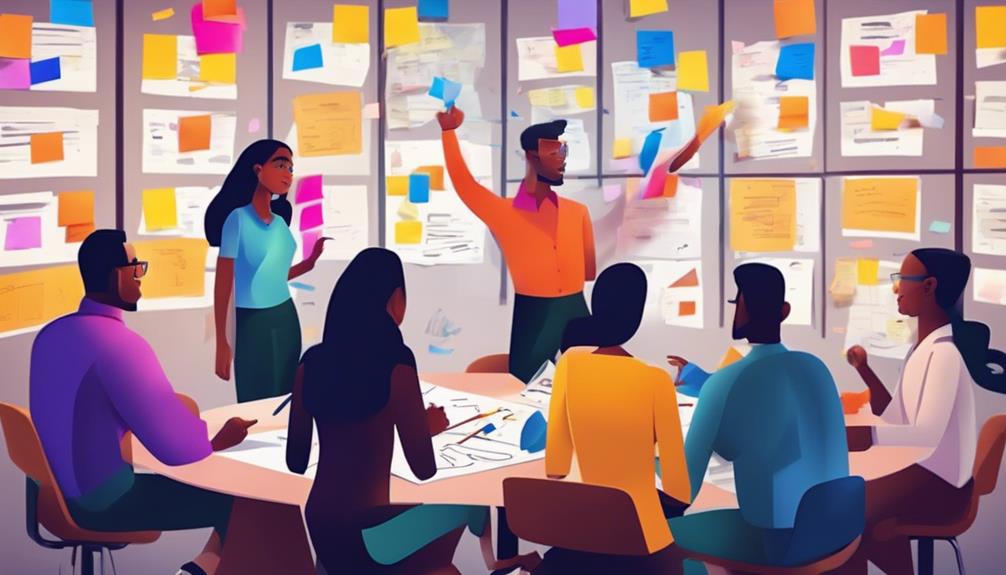Unlocking growth hinges on specific feedback. It gives you clear, actionable steps to improve and fosters self-awareness. By pinpointing your strengths and weaknesses, it enables targeted actions for continuous development. Timely feedback amplifies these benefits, ensuring you understand your performance context. As you track progress, you'll find clarity in setting goals and adjusting strategies. Embracing this level of specificity helps you stay accountable and motivated. With focused feedback, you can sharpen your skills and enhance your self-awareness. Curious about how to implement these strategies effectively? You might find even more insights to support your growth journey. For example, in the context of education, specific feedback is invaluable for improving teacher skills. It allows educators to identify areas for growth and tailor their professional development efforts accordingly. By receiving targeted input on their teaching techniques, educators can make measurable progress and ultimately enhance student learning outcomes.
Key Takeaways
- Specific feedback provides clear, actionable steps, enhancing self-awareness and guiding targeted improvement efforts.
- Timely feedback reinforces learning, ensuring relevance and preventing confusion in performance evaluation.
- Clarity in feedback helps identify strengths and weaknesses, fostering accountability and focused goal setting.
- Tailored feedback aligns with individual learning goals, promoting a growth mindset and continuous development.
Significance of Specific Feedback
Specific feedback plays a crucial role in your development by providing clear, actionable steps that drive improvement and enhance self-awareness.
When you receive detailed feedback, it clarifies your strengths and weaknesses, allowing you to focus on specific areas for growth. Research shows that this kind of feedback leads to better outcomes, increasing your chances of success.
By acting as a guiding compass, effective feedback emphasizes the need for specificity and timeliness in the process. It helps you track your progress, making it easier to measure your effectiveness and adjust your strategies.
Ultimately, embracing specific feedback empowers you to take targeted actions that lead to continuous self-improvement, ensuring you stay on the path toward your goals.
Mechanisms Driving Growth
Tailored feedback is vital for your growth, as it aligns with your learning goals and fosters a growth mindset.
By engaging in formative assessments, you can gauge your progress and identify areas needing improvement. Input from teachers or mentors delivers specific insights that help you refine your skills.
Regular self-assessment allows you to pinpoint where you can enhance your performance and implement actionable steps for tangible progress. Embracing feedback means recognizing the specific areas that require attention and setting clear, achievable goals for continuous self-improvement.
Each step you take, informed by constructive feedback, drives you closer to your aspirations, ultimately leading to meaningful growth.
Stay proactive and open to feedback—it's your pathway to success.
Importance of Clarity in Feedback

Clear feedback is crucial because it eliminates confusion and empowers you to track your progress effectively.
When you receive specific and clear insights, you can easily identify what you're doing well and what needs improvement. This clarity helps you set focused goals and adjust your strategies accordingly.
Without clear feedback, you might find yourself lost, unsure of how to enhance your performance or reach your objectives.
Moreover, precise feedback fosters a sense of accountability, motivating you to take actionable steps toward growth. Teachers who receive effective feedback also feel validated and supported in their professional development, which ultimately leads to improved student outcomes. By providing specific and constructive feedback, administrators can help teachers pinpoint areas for improvement and tailor professional development opportunities to meet their individual needs. Research has shown that when teachers receive effective feedback for teachers, they are more likely to implement changes in their practice and ultimately enhance their effectiveness in the classroom.
By understanding exactly what's expected, you can concentrate your efforts where they matter most, ultimately leading to more significant personal development and success.
Embrace clear feedback to unlock your true potential.
Effective Self-Improvement Strategies
Effective self-improvement strategies start with setting precise goals that guide your growth journey.
Break these goals into smaller, actionable steps to maintain focus and motivation.
Regularly track your progress, as this helps you recognize achievements and adjust your strategies when necessary.
Embrace feedback from mentors, peers, or self-assessments, as it provides clarity on your strengths and areas needing improvement.
Additionally, cultivate a growth mindset by viewing challenges as opportunities for learning rather than obstacles.
Stay committed to your goals, and don't hesitate to refine them as your skills develop.
Finally, celebrate your successes, no matter how small, to foster a positive attitude toward continuous self-improvement.
Advantages of Specific Feedback

Specific feedback sharpens your focus, pinpointing exactly what you need to improve for optimal growth. It clarifies your strengths and weaknesses, helping you target your development effectively.
When you receive specific insights, you can take actionable steps that lead to tangible progress. This type of feedback enhances your self-awareness, allowing you to recognize key behaviors that contribute to your success.
It acts as a guiding compass, steering you toward your goals with precision. With specific feedback, you're not left guessing what to work on; you have clear direction.
Role of Timeliness in Feedback
Timely feedback amplifies the benefits of specific insights, ensuring you can act on them while the information is still fresh and relevant.
When you receive feedback swiftly, you're more likely to remember the context and nuances of your performance. This immediacy helps you make necessary adjustments and enhances your learning experience.
Waiting too long for feedback can lead to confusion or a disconnect between the insights provided and your current actions. By prioritizing timely responses, you not only strengthen your understanding but also create a dynamic feedback loop that fosters continuous improvement.
Ultimately, acting on feedback while it's still timely can lead to quicker growth and more effective skill enhancement, making it an essential aspect of your development journey.
Keys to Effective Feedback

When you seek feedback, focusing on key elements like clarity, specificity, and relevance can significantly enhance your growth and development.
Start by asking for detailed feedback that pinpoints your strengths and areas needing improvement. This specificity helps you understand exactly what actions to take.
Clarity is equally important; ensure the feedback is straightforward, so you know what's expected.
Additionally, relevance matters—feedback should align with your goals and the context of your work.
Timely feedback is crucial, too; receiving it shortly after performance ensures you can apply insights effectively.
Lastly, embrace a growth mindset; view feedback as an opportunity for learning rather than criticism.
These keys will empower you to make meaningful progress on your journey of self-improvement.
Frequently Asked Questions
How Can I Request Specific Feedback From My Peers?
To request specific feedback from your peers, ask direct questions about particular areas you want to improve. Be clear about your goals, and encourage them to share honest, constructive insights that can guide your development.
What Tools Can Help Track My Progress After Receiving Feedback?
To track your progress after receiving feedback, use tools like journals, progress charts, and apps designed for goal tracking. Regularly review and adjust your strategies to ensure continuous improvement and stay focused on your objectives.
How Often Should I Seek Feedback for Continuous Improvement?
You should seek feedback regularly—ideally after completing significant tasks or projects. This keeps your progress on track, allows for timely adjustments, and ensures you're consistently growing and refining your skills based on actionable insights.
Can Negative Feedback Still Be Beneficial for Growth?
Yes, negative feedback can be beneficial for growth. It highlights areas needing improvement and encourages you to reflect on your actions, helping you develop resilience and a clearer path toward achieving your goals.
What Are Common Barriers to Accepting Feedback Effectively?
Common barriers to accepting feedback effectively include defensiveness, fear of criticism, and lack of trust. You might also struggle with emotional reactions or misinterpretations, which can hinder your ability to learn and grow from the feedback provided.
Conclusion
In conclusion, embracing specific feedback can be a game-changer for your personal growth.
It not only highlights your strengths but also provides clear steps for improvement.
By focusing on actionable insights, you foster a growth mindset and pave the way for continuous progress.
Remember, the more precise and timely the feedback, the more effectively you can navigate your development journey.
So, take the feedback you receive, apply it, and watch yourself unlock your full potential.









